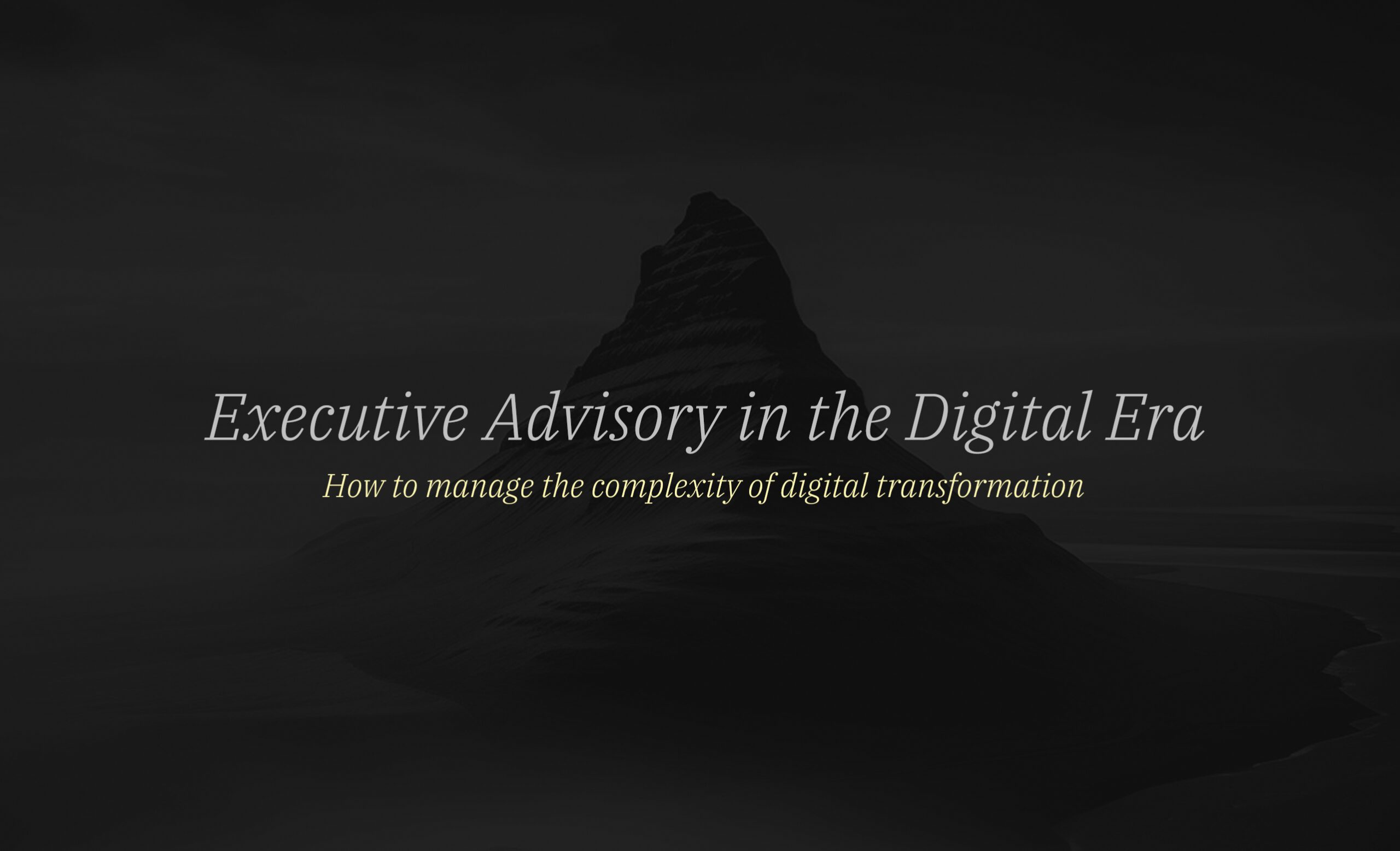Introduction
In today's rapidly evolving digital landscape, organizations need expert guidance to navigate the complexities of digital transformation. Executive advisory services have emerged as a critical support system for businesses, providing expert insights and strategies to help organizations adapt and thrive. This blog article explores the evolving role of executive advisory in the digital age, highlighting key areas of focus and the benefits that come from leveraging expert advice.
I. The Evolving Role of Executive Advisory in the Digital Age
A. Traditional vs. digital executive advisory
Traditional executive advisory services have long focused on providing strategic guidance to organizations across various industries. However, in the digital era, the role of executive advisors has evolved to include expertise in digital technologies, analytics, and digital marketing. As a result, modern executive advisory services combine industry expertise with cutting-edge technology to provide comprehensive support for businesses navigating the digital landscape.
B. The need for data-driven decision making
Data-driven decision making is a cornerstone of successful digital strategies. By harnessing the power of data, organizations can make informed decisions, optimize operations, and drive innovation. Executive advisors play a crucial role in helping organizations develop data-driven strategies, ensuring that businesses are well-equipped to capitalize on the opportunities presented by the digital age.
C. Combining industry expertise with cutting-edge technology
Today's executive advisors must possess a deep understanding of both industry-specific challenges and the latest digital technologies. This combination of expertise enables advisors to provide tailored, actionable guidance to organizations seeking to transform their operations and capitalize on the opportunities presented by the digital era.
II. Key Areas of Focus for Executive Advisory in the Digital Era
A. Digital Strategy
- Assessing digital maturity
To develop an effective digital strategy, organizations must first understand their current level of digital maturity. Executive advisors can assist with this assessment, helping businesses identify their strengths and weaknesses and determine the most effective path forward. - Developing a digital roadmap
A digital roadmap is an essential tool for guiding organizations through their digital transformation journey. Executive advisors can help businesses create a comprehensive, step-by-step plan that outlines their digital goals and the strategies needed to achieve them. - Balancing innovation with risk management
Innovation is essential for staying competitive in the digital era, but it also comes with risks. Executive advisors can help organizations strike the right balance between innovation and risk management, ensuring that businesses can capitalize on new opportunities while mitigating potential threats.
B. Digital Marketing
- Omni-channel marketing strategies
Omni-channel marketing is a critical component of digital success. By creating seamless, integrated experiences across all channels, organizations can engage customers more effectively and drive revenue growth. Executive advisors can help businesses develop and implement effective omni-channel marketing strategies, ensuring that they are well-positioned to succeed in the digital age.
- Personalization and data-driven marketing
Personalization is a powerful tool for engaging customers and driving conversions. By leveraging data and advanced analytics, organizations can create personalized experiences that resonate with their target audience. Executive advisors can provide guidance on the most effective personalization strategies, helping businesses optimize their marketing efforts for maximum impact.
- Leveraging marketing automation and AI
Marketing automation and artificial intelligence (AI) are revolutionizing the way organizations approach marketing. By streamlining processes and harnessing the power of AI, businesses can drive efficiency and improve marketing outcomes. Executive advisors can help organizations select and implement the right marketing automation tools, ensuring that they are well-equipped to capitalize on the benefits of these advanced technologies.
C. Digital Operations
- Streamlining processes through digitalization
Digitalization can transform the way organizations operate, driving efficiency and improving overall performance. Executive advisors can help businesses identify areas where digitalization can have the greatest impact, guiding them through the process of implementing digital solutions to streamline operations
- Implementing agile methodologies
Agile methodologies have become increasingly important in the digital era, enabling organizations to respond quickly to changing market conditions and customer needs. Executive advisors can help businesses adopt agile practices, ensuring that they can rapidly adapt to new challenges and opportunities as they arise.
- Enhancing supply chain management with digital tools
Digital tools and technologies can significantly improve supply chain management, driving efficiency and reducing costs. Executive advisors can help organizations identify and implement the most effective digital solutions for their supply chain, ensuring that they can capitalize on the benefits of digital transformation.
D. Data Analytics and Insights
- Harnessing the power of big data
Big data offers organizations the opportunity to gain unprecedented insights into their operations, customers, and market trends. Executive advisors can help businesses develop strategies for harnessing the power of big data, ensuring that they are well-equipped to leverage these insights for maximum impact.
- Implementing advanced analytics tools
Advanced analytics tools are essential for turning raw data into actionable insights. Executive advisors can provide guidance on the most effective analytics tools and techniques, helping organizations transform their data into a powerful strategic asset.
- Transforming data into actionable insights
Data-driven decision making is only effective if organizations can turn their data into actionable insights. Executive advisors can help businesses develop strategies for leveraging their data, ensuring that they can make informed decisions and drive innovation.
III. The Executive Advisory Advantage
A. Comprehensive suite of services
Executive advisory services provide organizations with a comprehensive suite of support, covering all aspects of digital transformation. From strategy development to implementation, executive advisors can help businesses navigate the complexities of the digital era and achieve their goals.
B. Industry-specific expertise
Executive advisors possess deep industry-specific expertise, enabling them to provide tailored solutions that address the unique challenges faced by organizations in various sectors. This specialized knowledge is invaluable for businesses seeking to transform their operations and capitalize on the opportunities presented by the digital age.
C. Client-centric approach
Executive advisors take a client-centric approach to their work, focusing on building collaborative partnerships and delivering sustainable results. This approach ensures that organizations receive personalized support, tailored to their specific needs and objectives.
IV. Challenges and Opportunities for Executives in the Digital Era
A. Navigating digital disruption
Digital disruption is a major challenge for organizations in the digital era, with new technologies and business models constantly emerging. Executive advisors can help businesses navigate this disruption, providing expert guidance on how to adapt and thrive in a rapidly changing landscape.
B. The importance of continuous learning and adaptability
In the digital era, continuous learning and adaptability are essential for success. Executive advisors can help organizations foster a culture of learning, ensuring that they are well-equipped to stay ahead of the curve and capitalize on new opportunities as they arise.
C. Balancing short-term objectives with long-term vision
Balancing short-term objectives with long-term vision is a key challenge for organizations in the digital age. Executive advisors can provide valuable guidance on how to strike this balance, ensuring that businesses can achieve their immediate goals while also laying the groundwork for future success.
V. Preparing for the Future of Executive Advisory
A. The role of AI and machine learning in executive advisory
AI and machine learning are set to revolutionize the field of executive advisory, enabling advisors to provide even more precise and actionable insights. By staying abreast of the latest developments in these technologies, executive advisors can ensure that they are well-positioned to capitalize on the benefits they offer.
B. Embracing virtual collaboration and remote work
Virtual collaboration and remote work have become increasingly important in the digital era, enabling organizations to access talent and expertise from around the world. Executive advisors must embrace these trends, leveraging digital tools and platforms to provide seamless, effective support to their clients.
C. Staying ahead of emerging digital trends and technologies
As the digital landscape continues to evolve, staying ahead of emerging trends and technologies is critical for executive advisors. By continuously updating their knowledge and skills, advisors can ensure that they are well-equipped to provide organizations with the most up-to-date guidance and support, helping them stay competitive in an ever-changing digital environment.
Conclusion
The ongoing importance of executive advisory in the digital era cannot be overstated. As organizations navigate the complexities of digital transformation, expert guidance is essential to help them adapt, innovate, and thrive. By leveraging the expertise of executive advisors, businesses can maximize growth and efficiency, positioning themselves for long-term success in the rapidly evolving digital landscape.



No comments.